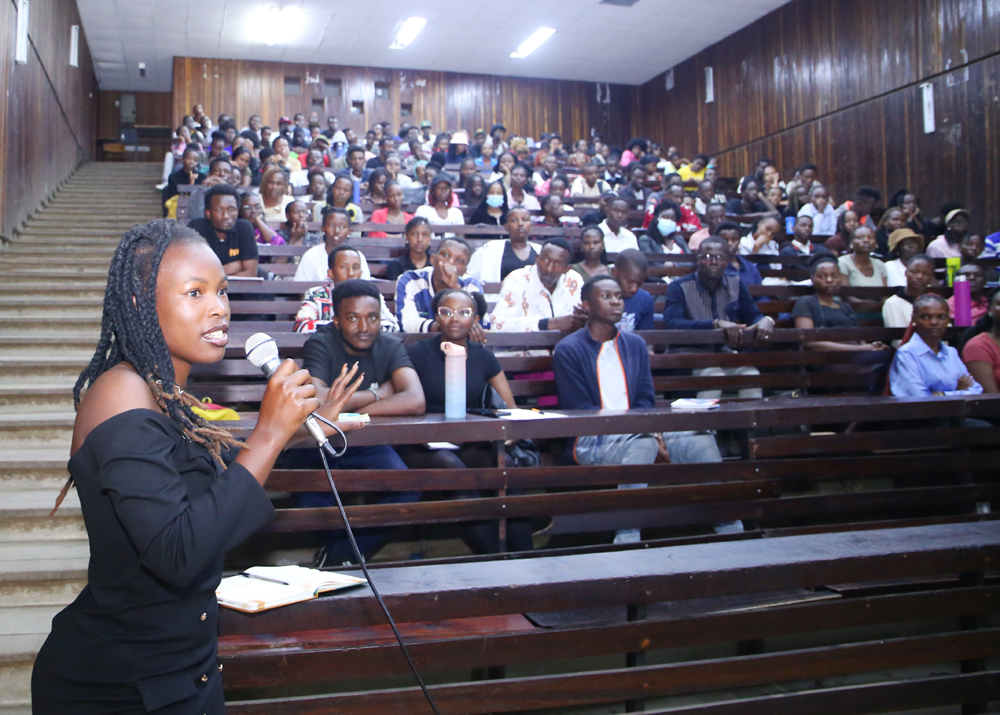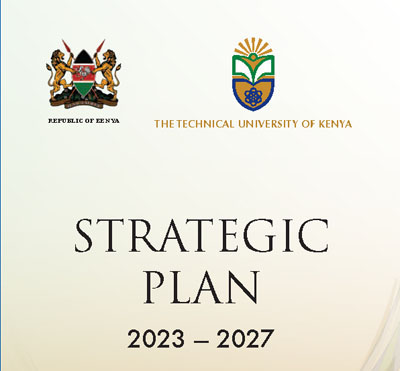Media experts have assured communication and journalism learners of new and exciting career opportunities away from the traditional media, in the wake of new media fronts and the exponential information, technological, and communication growth. The rapid growth witnessed across the globe, including artificial intelligence (AI), has largely affected how media content is produced, packaged, and disseminated, demanding new and innovative ways of media practice.
Renowned media experts from the leading media houses in Kenya, including Nation Media Group (NMG), Standard Group (SG), the Deputy CEO and Director of Training at the Media Council of Kenya (MCK), Mr. Victor Bwire, and lecturers from the Department of Journalism and Media Studies spoke to third year and graduating journalism classes at the Technical University of Kenya (TU-K). Some of the freshmen and sophomores also attended.
The experts also praised TU-K for its excellent training in journalism.
“I lectured here sometime back, and I can assure you that majority of media personalities were trained here – the then Kenya Polytechnic. I know of more than 60 of my students practicing in mainstream media and other communication-related fields. The alumni office needs to take advantage of this and profile graduates from this institution who are doing an excellent job in the field,” Mr. Bwire said.
Mr. Bwire noted that classical journalism has stood the test of time and has been rejuvenated in the wake of rapid growth in ICTs, opening up vast opportunities that communication students and professionals can explore for their career growth and carry on the noble media practice.
He said that traditional journalism skills remain the basis of practice, despite the technological growth currently witnessed. Practitioners, especially upcoming journalists, must arm themselves with several other skills including; multimedia knowledge and web and mobile-based communication concepts like content marketing among others.
“Students should learn how to pitch stories and proposal writing. Journalism is no longer in the newsrooms, and individuals can now report from anywhere to any media worldwide,” Bwire added.
Mr. Mike Owuor, the Sunday Nation Lead Editor, told the students that new media is opening up the media landscape and even going beyond the traditional newsrooms.
Mr. Owuor noted that corporates are now producing in-house media content and disseminating it independently. They are looking out for young people with a journalism background but with multifaceted skills.
He challenged the upcoming talent adapt to the new media landscape and have knowledge of skills including; multimedia skills, video editing, photography, web publishing and tools, search engine optimisation (SEO & algorithms), social media content production, data analysis and visualization, augmented reality, among others.
Prof. Tom Kwanya (represented Executive Dean – Faculty of Social Sciences and Technology Prof. Peter Matu), Dr. Julius Bosire (Ag. Director School of Creative Arts and Media), Mr. Orina Ogato, Mr. Orleans Onindo, Mr. Amos Marube, Dr. Rhoydah Nyambane, Dr. Liz Gitonga and Mr. Oketch Kendo from the Department also attended the lecture.
The Standard Group Quality Control Editor Linda Bach challenged the students to be proactive, yearn to learn new ideas and trends, make networks in fields of interest, and brand themselves.
She challenged the students to harness their writing skills. They can begin by writing letters to the editor, developing news briefs that can carry by lines and publish their copies in blogs among other platforms.
The media experts shared internship and job opportunities, listing some of the platforms where the learners can get a head start.
At NMG, students can apply for internships, media lab training, or a job through their website.
“NMG’s media lab training takes in graduates from different career fields and is set to bridge the big gap between class and industry, with the training targeted at specialised reporting,” Owuor noted.
MCK has also taken a leap in ensuring learners from the 52 universities and colleges teaching media and communication get attachment or internship placement before they graduate.
Mr. Bwire noted that the Council has entered into agreements with media houses in Kenya to see learners placed.
Currently, there are 225 radio stations broadcasting and domiciled in Kenya, 135 TV stations, 100 print circulations, more than 3,000 blogs, and over 23 million Kenyans with access to android phones with over 98% internet penetration in Kenya.
“Students need to apply for internship through the MCK websites. An independent team carries out the selection process. Up to 80% of those placed in various houses have been retained,” Bwire noted. Adding that MCK also offers students internship opportunities.



